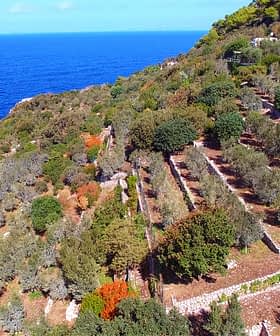Italy Fears Running Out of Olive Oil By April
Unusual weather, Xylella fastidiosa and the removal of ancient trees for the Trans-Adriatic Pipeline in Puglia, have caused Italy's olive oil production to hit a 25-year low.
Following a disastrous olive harvest in which yields fell to a 25-year low, there have been reports that Italy may run out of olive oil in months.
We risk forever losing the chance to consume Italian extra virgin olive oil, which will have disastrous effects on the economy, jobs, health and the countryside.
“We risk forever losing the chance to consume Italian extra virgin olive oil, which will have disastrous effects on the economy, jobs, health and the countryside,” the Italian farming lobby, Coldiretti, told The Times.
Italy’s olive oil production dropped to 185,000 tons according to figures released by the Institute of Services for the Agricultural and Food Market (ISMEA).
Consumers, who felt the blow as olive oil prices rose by 31 percent last month, could be left high and dry by April and producers forced to top up with Tunisian olive oil.
See Also:Trans-Adriatic PipelineAn olive oil shortage could bring a halt to traditional pizza twirling in Naples because as Enzo Coccia, a master Neapolitan pizzaiolo told Olive Oil Times, a light, high quality extra virgin olive oil has been an essential ingredient of the Neapolitan pizza since 1900.
“At La Notizia I use only extra virgin olive oil DOP of Sorrento Coast or Salerno Hills, but we can use also a good extra virgin olive oil that comes from Tuscany, Sicily or Liguria,” Coccia said.
Unusual weather conditions, including heavy rains and the early onset of winter, have contributed to Italy’s poor harvest along with an ongoing battle against deadly Xylella fastidiosa that has ravaged many of its olive groves.
Puglia’s ancient olive groves which produce around 50 percent of Italy’s total olive oil production saw yields fall by around 65 percent this season. Farmers in the region were dealt the added blow of watching on as up to 10,000 ancient olive trees were uprooted to make way for the controversial Trans Adriatic Pipeline (TAP). Appeals and protests failed to halt the project but delayed work until 2017.
“It’s dramatic here now, our olive oil has wonderful quality since two years, but someone wants to destroy them,” local resident and strong supporter of the NOTAP movement, Sabina Giese, told Olive Oil Times.
“In our region there are many reasons why the oil and olive trees need protection,” she added. “TAP is uprooting more than 10,000 olive trees between Melendugno and Mesagne.”
Giese also alleged that where TAP is currently drilling, the ground has been poisoned by arsenic and hexavalent chromium. Olive Oil Times was unable to independently verify this claim.
A spokesperson for TAP has previously told Olive Oil Times that the uprooted trees were to be temporarily taken care of in nurseries and trees found to be infected with Xylella would be destroyed instead of relocated. TAP has also stated that it is committed to “avoiding, minimizing and mitigating any negative effects on the environment.”
Giese blames the government and believes the heavy handed approach, which forced Puglian olive farmers to use strong pesticides and fell infected trees or face massive fines, was a strategy to replace local varieties of olive trees with super intensive oil producers who require vast amounts of water as well as expensive nutrition and treatments to thrive.
“Xylella is also damaging our trees,” Giese said. “There would be a natural way to cure the trees but the government is imposing the use of very strong pesticides to kill the bacterium with huge consequences for the environment and to control what trees should be planted after the extinction of our local natural olive trees.”
Earlier this year Assitol, the association of Italian olive oil producers, highlighted the struggles brought about by Italy’s traditional approach to olive oil production with its high costs and failure to expand and meet demands.








